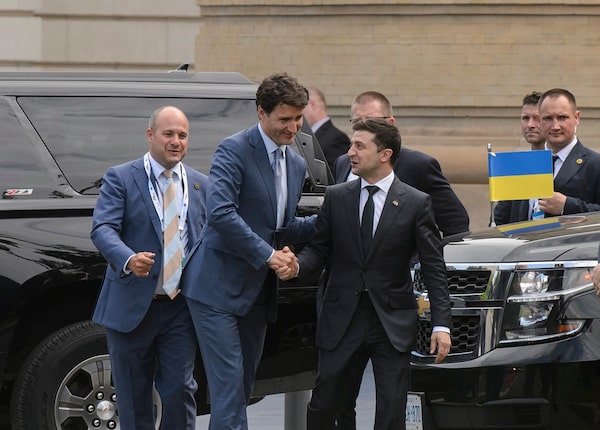
Canadian Prime Minister Justin Trudeau and Ukrainian President Volodymyr Zelenskiy arrive before joining foreign delegates at the University of Toronto during the Ukraine Reform Conference in Toronto, on July 2, 2019.Andrew Lahodynskyj/The Canadian Press
From a distance, he’s a fairy-tale figure: Last year, he was an actor starring in a TV comedy series about an ordinary guy who becomes leader of his country; then this April, in a surprise turn of events, he was elected President of his country, Ukraine, on an anti-corruption agenda.
On Tuesday, politicians from around the world got their first up-close look at Volodymyr Zelensky in Toronto, where the 41-year-old comedian-turned-President attended a high-level conference on Ukrainian economic and political reform hosted by Prime Minister Justin Trudeau and Foreign Minister Chrystia Freeland.
Mr. Zelensky impressed foreign ministers and senior bureaucrats with his frankly reformist rhetoric and his quick wit – he joked about his lack of affinity with the Toronto Raptors and twice quoted the wisdom of Ukrainian-Canadian icon Wayne Gretzky.
He reiterated promises to bring Ukraine to the European Union and the North Atlantic Treaty Organization. But behind the scenes, you could sense a hesitancy toward this largely unknown man who has pledged to bring his country closer to a Western world that no longer agrees on the best approach to Ukraine.
“I think the sincerity is there, but frankly, a lot of the people I speak to here feel that he hasn’t shown a lot of substance and wonder if he can live up to his words," said Paul Grod, the Canadian businessman who is president of the Ukrainian World Congress and has briefed Mr. Zelensky on international relations. “The real question they’re asking is, who is he? Is he really his own man? Is there anyone in the background pulling his strings? I think this meeting was important to make sure he’s getting the advice he needs.”
Mr. Trudeau and Ms. Freeland made some modest new pledges of support to Ukraine, whose military confrontation with Moscow, after Russian troops occupied Crimea and began attacks on eastern Ukraine in 2014 has left it beleaguered. They promised an additional $45-million in development aid and policing assistance, as well as a pledge that Canada would not admit anyone trying to enter the county on Russian passports issued to residents of Russian-occupied Crimea and eastern Ukraine and a recommitment to provide armaments and military support.
But behind the scenes, Canadian officials were more hesitant.
Beyond those cold feet, there has been a distancing by many Western countries from wholehearted support of Ukraine since the heady days of 2014, when Ukraine’s fate was seen then as a stark choice between eventual integration into the EU and NATO, or an alliance with Russia – a view that was reinforced by Russia’s invasion.
Today, European countries are divided over how to approach Ukraine. German officials said they do not want to see Ukraine on a pathway to EU or NATO membership at all – citing worries about expanding an already unstable 28-country bloc and concerns about aggravating Russia further by expanding Western-dominated military presence to its borders. French and Dutch officials have expressed similar views.
On the other hand, foreign ministers from central and Eastern Europe said on Tuesday that they strongly support Ukraine’s path toward membership. Hungarian Foreign Minister Peter Szijjarto told The Globe and Mail that his government wants to see Ukraine in the EU if its citizens so choose, even though Hungarian President Viktor Orban often expresses opposition to the EU and its powers.
So Mr. Zelensky, even if he is successful in his anti-corruption reforms, might have trouble fulfilling his pledge to bring his country closer to a Europe that can’t agree on whether to accept it.
“There is a problem that Europe is facing some identity crises of its own, independent of Ukraine," said Kurt Volker, the U.S. State Department’s Special Representative for Ukraine Negotiations. “You have nationalist populist parties rising up, concern [about] immigration or unemployment or religion or identity or whatever it might be. And the U.K. is leaving the EU. So there are a lot of identity crises in the EU, which makes it hard for them to think about future membership for anybody.”
As he and other observers see it, Mr. Zelensky will have to make his country look more appealing to countries that have become wary of its economic inefficiency and corruption. “If you ask investors in the West if they believe Ukraine is going to stay stable, the answer is, ‘We’re not certain,’” said David Lipton, a deputy director of the International Monetary Fund. “Corruption has done terrible things to hold the Ukrainian economy back.”
That’s why Canadians and other officials are taking a hesitant approach: So many investments in Ukraine have disappeared into a fog of corruption that they want to see real reforms first, before any discussions of a greater role for Ukraine can begin
Our Morning Update and Evening Update newsletters are written by Globe editors, giving you a concise summary of the day’s most important headlines. Sign up today.
 Doug Saunders
Doug Saunders